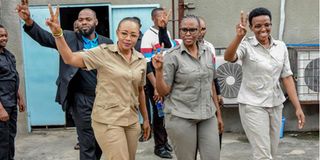Walk the talk on women’s rights, voices

Chadema MPs Halima Mdee (right), Ester Matiko (left) and Ester Bulaya (centre) acknowledge their supporters as they attend a press conference after being released from Segerea prison in Dar es Salaam, Tanzania, on March 12, 2020.
What you need to know:
- In Uganda, feminist-political activist Stella Nyanzi had been repeatedly harassed, arrested and detained, for daring to speak against authority.
- Tanzania has heightened intolerance of dissent as its recent elections remain soiled with violations of human rights and flouting of democratic processes.
- Prof Wangari Maathai, like many others, was publicly and violently brutalised for fighting to protect the environment.
There’s an old saying that goes, “It’s easier to deal with your neighbour’s demons than your own”, which I’ve been thinking about this past week. Dealing with distant demons is easier as that makes it less complex to speak on an issue because you’re not directly attached.
Another reason it’s easy to cast out demons that are far from you is that you don’t have to face your own shortcomings that contribute to the existence of demons in your own home.
A great example of this is how a majority of African countries where heads of state, political party leaders and many other male-headed institutions lend their voices in support of other female heads yet back home, they spend their time destroying opportunities for women.
It, therefore, shouldn’t surprise us when we see congratulatory sentiments from these heads of state and political figureheads towards America’s first black female vice-president.
In 2019, I wrote about the East African clampdown on women whose voices made particular heads of state uncomfortable. In Uganda, feminist-political activist Stella Nyanzi had been repeatedly harassed, arrested and detained, for daring to speak against authority.
In 2018, Rwandan opposition activist and former presidential candidate Diane Rwigara was released on bail, after spending more than a year in jail on charges including inciting insurrection against the government of President Paul Kagame. In 2019, Tanzania’s Halima Mdee – leader of the main opposition’s women’s wing, MP and lawyer – was arrested.
Violations of human rights
Tanzania has heightened intolerance of dissent as its recent elections remain soiled with violations of human rights and flouting of democratic processes. Kenya is not left behind. Prof Wangari Maathai, like many others, was publicly and violently brutalised for fighting to protect the environment.
This is in spite of data and evidence that shows how women’s journeys in politics are completely different from men’s and that the latter should play a more conscious role in expanding the space. Women have been the backbones of many democracies with their grassroots organising, political mobilising, strategising, educating and sustaining resistance, yet the misinformed belief is, actively including women – which is very different from tokenist inclusion – is seen as unpalatable.
Supporting and including women is no longer a distant dream that African leaders can talk about in passing. It is a requirement in building inclusive societies that recognise that women should be part of key structures. It is, therefore, time that each African leader or political figurehead began demonstrating what their plans are for women, with the structures that are currently held by men.
If there’s one thing that’s certain, it’s that leaders who refuse to listen to their people will be made to listen because the female demographic is where numbers that deliver power reside.
The writer is a policy analyst. [email protected]





